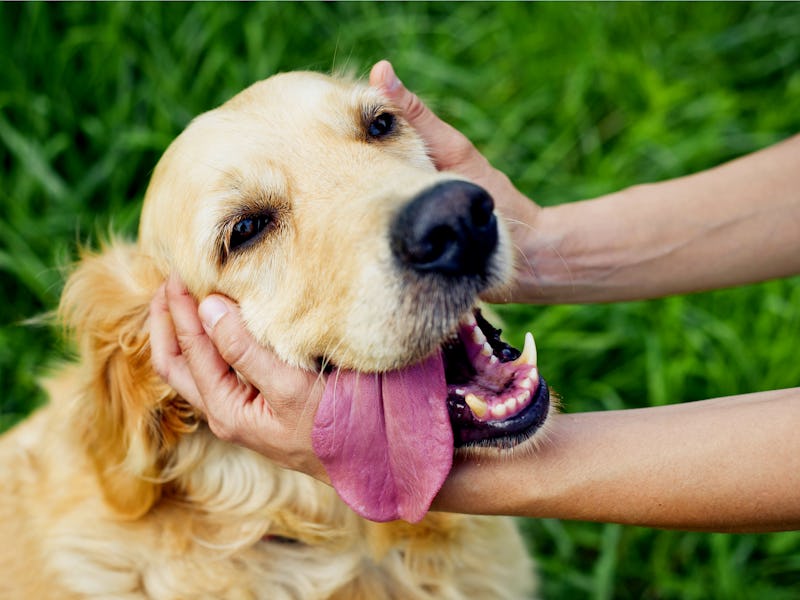3 ways pets can improve your mental health immediately
"There is something unique about our relationship with animals."

When it comes to pets studies show that their presence can really benefit the mental health of many people. However, why exactly that is and in what ways can depend on the person and the animal they’re spending time with.
Carri Westgarth, Ph.D., a lecturer in human-animal interactions at the University of Liverpool, says there’s a number of hypotheses that explain why being around pets can cause beneficial effects. None of them take a long time to take effect either.
One is the social support hypothesis, which suggests that it is the companionship they provide that is good for our health.
A version of this article first appeared as the Sunday Scaries newsletter. Sign up for free to receive it on Sundays.
3. Pets create “social capital”
“We know that social support from friends and family is important for well-being, and pets may contribute to this through the interactions they have with us,” Westgarth explains, “but also, the interactions they facilitate with other people — like talking to strangers on a dog walk.”
Accordingly, a 2005 survey of 339 adult residents from Perth, Australia, demonstrated that pet ownership was linked to experiencing positive interactions with neighbors, which suggests pets are a form of “social capital” that benefit human health. Meanwhile, a 2011 study found that, compared to people who don’t own pets, pet owners tend to be less self-conscious and have greater self-esteem.
Pets make us more active, which is good for the body and the brain.
2. Pet owners are more physically active, and happier for it
That study also found that pet owners tend to get more exercise, which connects to the second hypothesis as to why pets are good for us: They make us more physically active, which is good for the body and brain. Various studies show how these effects manifest. For example, a study published this August found that owning a dog is associated with better cardiovascular health, while a 2015 [studyhttps://www.mayoclinicproceedings.org/article/S0025-6196(15)00674-6/abstract) found that the majority of pet owners who let their animals sleep with them actually end up having less disruptive sleep.
Furthermore, our physical reaction to animals runs deep. James Serpell, Ph.D., a professor of animal welfare and ethics at the University of Pennsylvania, explained to me that the current theory is that animal companionship has an ability to suppress our stress response, perhaps by stimulating the secretion of the bonding hormone, oxytocin, in the brain.
“Prolonged or chronic stress responses are known to be detrimental to both mental and physical health,” Serpell says. “Animal companionship has been shown to increase the secretion of oxytocin and reduce secretion of the stress hormone, cortisol.”
"There is something unique about our relationship with animals that adds to our lives."
1. Pets get us closer to nature
Westgarth says our positive relationship with pets could also be explained by the biophilia hypothesis, which suggests that humans have an innate need to be around nature. Pets, she explains, fulfill that, “not just by the interaction with animals that they provide, but because looking after them also brings us into connection with nature.”
The relationship humans have with pets is special because it's unconditional in nature.
That’s not to say every relationship with an animal is the stuff of milk bones and rainbows. Serious behavioral problems can mean a great deal of stress, while Serpell notes that obviously the death of a beloved animal can lead to profound grief. But, when it comes to more positive relationships, animals can provide humans with a simple, supportive relationship — the sort that lacks the baggage of a human one.
“There is something unique about our relationship with animals that adds to our lives, and it’s not quite the same as the relationship we have with people,” Westgarth says.
She emphasizes that what makes that relationship special is its unconditional nature. Pets aren’t bothered by how much money you have, your success, or your popularity — you know, the stuff that digs under people’s skin.
However, life can’t be spent with animals alone.
“For optimal health, we surely need good human relationships as well as with animals,” Westgarth adds, “because it’s not that mentally healthy to sit at home with your dog all day, either.”
A version of this article first appeared as the Sunday Scaries newsletter. Sign up for free to receive it on Sundays.